Editor’s Note: Sign up to get this weekly column as a newsletter. We’re looking back at the strongest, smartest opinion takes of the week from CNN and other outlets.
In Arthur Conan Doyle’s story, “Silver Blaze,” Sherlock Holmes investigates the disappearance of a famous racehorse and the “tragic murder of its trainer.” A police inspector asks the detective, “Is there any point to which you would wish to draw my attention?”
Holmes replies, “To the curious incident of the dog in the night-time.”
“The dog did nothing in the night-time,” the inspector said.
“That was the curious incident.” It was the dog that didn’t bark – because it knew the intruder well – that helped Holmes solve the mystery.
The red wave that didn’t break could help unravel the mystery of what happened last week.
Republicans failed to achieve the resounding midterm victory typically won by an opposition party against a president with a low approval rating. Democrats not only held on to control of the Senate but could increase their number by one if Georgia Democratic incumbent Raphael Warnock defeats Republican Herschel Walker in a runoff election next month. And if Republicans win a House majority, it will be by just a few seats.

It was only a little more than a week ago that Republicans thought they’d be savoring a crushing victory – and some Democrats were starting to blame each other for what they feared would be a disaster.
The New Yorker’s Benjamin Wallace-Wells reported November 4 that GOP campaign strategists said their candidates, including those in in competitive Senate races like Walker in Georgia and Mehmet Oz in Pennsylvania, were “heading for a clean sweep.” Wallace-Wells wrote, “The word that kept coming up in these conversations was ‘bloodbath.’”
The actual results sent some very different messages:
1. Voters cared about abortion rights and threats to democracy

“People sometimes wonder what it will take to get young people to the polls,” wrote Dolores Hernandez, a junior at the University of Missouri-Kansas City. “Well, after the 2022 midterms, they no longer have to guess.”
“Place in front of us an existential issue that could determine our future. Give us the knowledge that we can have a say about issues that affect us with our votes, and we will turn out in droves.” Hernandez and her fellow Gen Z friends saw abortion as that kind of existential issue.
At the University of Michigan, student activist Isabelle Schindler noted that the line of students seeking same-day registration to vote “on Election Day stretched across … campus, with students waiting for over four hours. There was a palpable sense of excitement and urgency around the election on campus. For many young people, especially young women, there was one motivating issue that drove their participation: abortion rights.”
Nationally, exit polls showed that voters between the ages of 18 and 29 supported Democrats over Republicans by a 63% to 35% margin; no other age group was nearly as pro-Democratic, with voters over 45 strongly favoring Republicans.
Before the election, some pundits argued that the anger of many voters at the Supreme Court’s decision to overturn Roe v. Wade had faded after five months, and that inflation would blot out most other concerns. They also argued that President Joe Biden was out of touch for focusing a major pre-election speech on the threat election deniers running for office posed to democracy. But both of those issues resonated.
“The abortion-rights side seemingly went a perfect five-for-five when it came to ballot initiatives, recognizing a state right to abortion in Michigan, California and Vermont,” wrote law professor Mary Ziegler. “Kentucky, a deep red state, turned away an attempt to say that the state constitution did not protect a right to abortion. Montana’s abortion measure, which threatened to impose criminal penalties on health care providers, was rejected by voters in Tuesday’s referendum.”
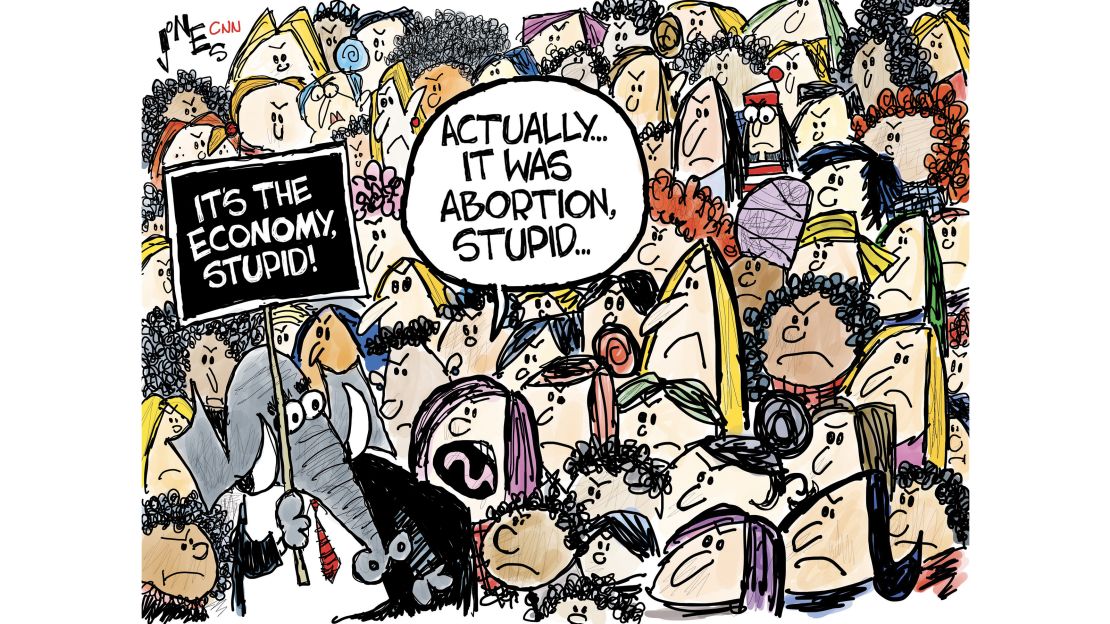
For more:
Edward Lindsey: In Georgia, here we go again
A reader roundup: For many Americans, this election is different. It’s personal
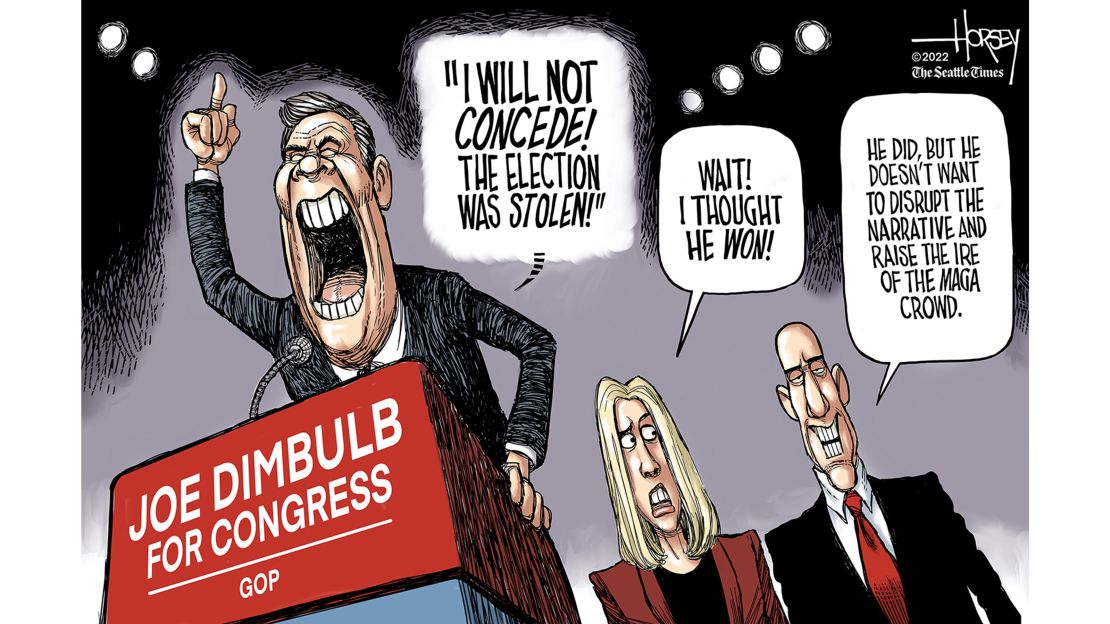
2. Extremism scares voters
John Avlon saw the midterms as “a repudiation of former President Donald Trump’s election lies and at least many of the top-ticket candidates who parroted them.”
“Yes, the economy matters – but so does democracy. And, in 2022, the message many voters were sending was ‘it’s the extremism, stupid.’”
“Consider the benchmarks for success in a typical midterm election: the opposition party gains an average of 46 seats in the House when the president is below 50% approval rating, as Biden is. While the final number is still being determined, GOP House gains will be far less than that,” Avlon noted.
“What a relief,” wrote Roxanne Jones. “It finally feels like a majority of voters want to re-center American politics away from the toxic, conspiracy theory-driven rhetoric we’ve experienced over the past several years.”

In Pennsylvania, Democrat Josh Shapiro soundly defeated Republican candidate Doug Mastriano in the gubernatorial race. Mastriano “scared many Pennsylvanians with his brash, take-no-prisoners Trump swagger,” wrote Joyce M. Davis of The Patriot-News, the newspaper serving Harrisburg. “He inflamed racial tensions, embraced Christian nationalism, and once said women who violated his proposed abortion ban should be charged with murder. On top of all that, he’s an unapologetic election denier,” Davis observed.
“Plenty of voters are worried about unchecked progressivism on the left, but they’re even more worried about unchecked extremism on the right,” observed Tim Alberta, in the Atlantic.
“That extremism takes many forms: delegitimizing our elections system, endorsing the January 6 assault on the Capitol, cracking jokes and spreading lies about the assault on House Speaker Nancy Pelosi’s husband. And all of this extremism, which so many swing voters spurned on Tuesday, is embodied by one person: Donald Trump.”
3. Joe Biden is a stronger leader than even many Democrats thought
When Biden was asked by a reporter Wednesday what he would do differently in the remaining two years of his term, he answered: “Nothing.”
That might be understandable, given Biden’s track record. “The midterms make clear that Biden is a much stronger president than he is often given credit for,” wrote historian Julian Zelizer. “He has been underestimated and criticized despite having a formidable first two years. The midterms should make Republicans nervous as they think about 2024.”
Biden not only defeated an incumbent president, but was “able to move a formidable legislative agenda through Congress, overcoming fierce Republican opposition and even winning a few GOP votes along the way. The American Rescue Plan, the Bipartisan Infrastructure Law and the Inflation Reduction Act stand up as a historic trifecta – a legislative track record arguably more significant than any that we have seen since President Lyndon Johnson’s Great Society.”
4. Donald Trump is a weaker leader than many Republicans thought
The midterms were “supposed to be a shellacking of President Joe Biden, but it was Trump who got the thumping,” Frida Ghitis wrote.
“In exit polls, 28% of voters said they chose their House vote ‘to oppose Donald Trump.’ And just 37% said they had a favorable view of the former president, the presumed GOP front-runner, at least before this election. That should alarm the party…”
“Despite his awful showing, Trump plans to declare his candidacy soon. Most Democrats find the prospect hard to stomach, but most Republicans would also like him to just focus on his golf game,” Ghitis noted.
Conservative commentator Scott Jennings wrote, “Florida Gov. Ron DeSantis sent a clear message to every Republican voter Tuesday night: My way is the path to a national majority, and former President Donald Trump’s way is the path to future disappointments and continued suffering.”
“Four years ago, DeSantis won his first gubernatorial race by less than a percentage point. His nearly 20-point win against Democratic candidate Charlie Crist on Tuesday sent the message that DeSantis, not Trump, can win over the independent voters who decide elections.”

For more:
Sarah Lenti: Lauren Boebert’s unexpectedly tight race shows the waning power of the MAGA brand
5. Rising and ebbing stars
Some careers were made – and others broken – in Tuesday’s election. Wes Moore, who became the first Black governor of Maryland, is a rising star, wrote Peniel Joseph. “A campaign based on championing equal opportunity, compassion for the incarcerated, education for all children, and hope in the future can not only win, but prove infectious enough to spread across the country,” observed Joseph. “Wes Moore’s victory has recaptured some of the magic that has been lost in our politics in the tumult of the past few years. Hopefully, this is just the beginning.”
Republicans are equally enthusiastic about DeSantis, but historian Nicole Hemmer suggested there are obstacles to his potential run for president. “Before declaring this the dawn of DeSantis, remember: It is just as likely the next few weeks will be the high-water mark of his presidential aspirations. The spotlight can very quickly become the hot seat, and DeSantis is both untested as a national candidate and as a Trump adversary. Those who see an easy pivot from the era of Trump to the age of DeSantis are likely in for another wave of disappointment, both because of the particulars of DeSantis’ victory and the persistence of Trump’s power.”
For Sophia A. Nelson, “the big heartbreak of the night” was the defeat of Stacey Abrams by Georgia Gov. Brian Kemp – “a repeat of her defeat to him four years ago, when the two tangled for what at the time was an open seat…”
“Had Abrams succeeded, she would have been the first Black woman to become the governor of a US state. After her second straight electoral loss, America is still waiting for that breakthrough.”
In Texas, Democrat Beto O’Rourke lost to incumbent Republican Greg Abbott for governor. In the Fort Worth Star-Telegram, Nicole Russell wrote that after “his third huge loss, it’s time for him to stop running for offices in Texas. We’ve had enough Beto for one lifetime. … His liberal policies are unwelcome and unwanted in Texas.”
For more:
David Andelman: Outside of America, this was an election that bucked the norm
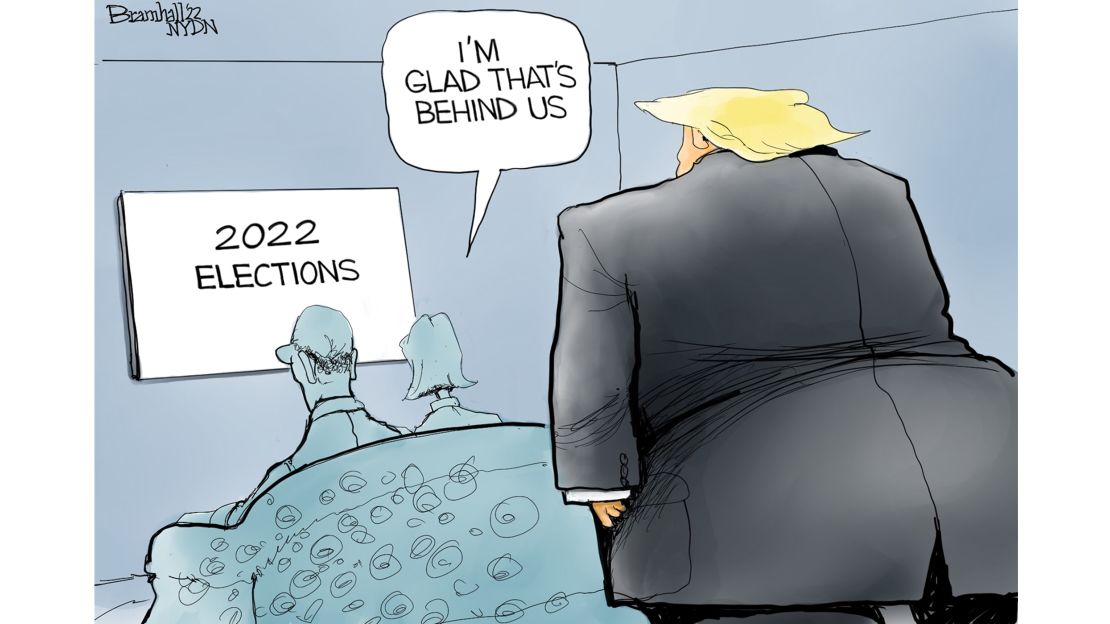
Russian retreat
In a new sign its invasion is faltering, Russia pulled troops out of the city of Kherson, the only regional capital it captured in Ukraine since the February invasion. The architect of the war, President Vladimir Putin, may be able to retain control of his nation for a time despite the debacle, wrote Mark Galeotti. But continuing defeat on the battlefield is going to have an impact: “Whatever happens … Putin’s dreams of establishing Russia as a great power on the back of its military strength are over, and so too are his ambitions of securing a legacy as one of the nation’s great state-builders.”
“His military machine is broken; his country’s economy so scarred that it will take years to recover; his reputation as a geopolitical mastermind in tatters. Putin-the-man may still cling to power for years, but Putin-the-legend is dead.”
Sexiest man alive?
The actor Chris Evans received an accolade that was first bestowed on Mel Gibson in 1985, “a candidate whose appeal, I think we can agree, has not aged well,” Sara Stewart observed.
“People magazine recently announced this year’s Sexiest Man Alive, which makes it a great time to ask: Can we get rid of the whole tradition of People’s Sexiest Man Alive?”
“Think about the inherent ridiculousness of declaring anyone the sexiest person alive. Sexiness, by its very nature, is subjective. So it’s a winky joke that People offers up its own tastes as if they are everyone’s. And by making their subject male, they’re tacitly saying: See, we’re not objectifying women, we’re so evolved. Men can be objects of lust too! Maybe that was (arguably) a subversive statement in the 1980s, when Playboy, Penthouse and other magazines imposed a misogynist ideal of sexiness at the newsstands. But now? Not so much.”
‘The Crown’

The new season of “The Crown,” which Netflix dropped on Wednesday, “charts the royals’ course through the turbulent 1990s, including Prince Charles and Princess Diana’s agonizing divorce and Elizabeth’s ‘annus horribilis’ in 1992, when a fire destroyed much of Windsor Castle,” wrote Holly Thomas.
“Details of the show’s storylines doing the rounds earlier this fall quickly drew ire, and one reportedly involving Charles, now King, lobbying for the Queen’s abdication prompted former UK Prime Minister John Major to describe the series as a ‘barrel-load of nonsense.’” Dame Judi Dench also warned that the series might “blur the lines between historical accuracy and crude sensationalism” as the nation continues to mourn Queen Elizabeth II, who died two months ago.
But as Thomas noted, “The Crown” hasn’t “masqueraded as a documentary or claimed to perfectly replicate private moments between royal family members. It has done what historical TV shows, films, plays and literary fiction always have: Use factual events as loose outlines, fill them in using artistic license and trust the audience’s intelligence to tell the difference. Its creator and writer, Peter Morgan, is a Commander of the Order of the British Empire for ‘services to drama,’ not history…”
Goodbye Twitter
Elon Musk is going to have to try to fix Twitter without the help of journalist Roxanne Jones. She’s had enough. “I deleted Twitter on the day Elon Musk became the platform’s new owner,” Jones wrote. “After a mostly dysfunctional 12-year relationship with Twitter that I admit brought some moments of joy, it was time to exercise my freedom of speech to say goodbye and good riddance.”
“That small act may not change much in the Twitter-verse of 237.8 million users. But for me, quitting Twitter was an act of power and self-care. I was setting boundaries for what I will, and will not, allow in my life.”
“Data points about rising racism on Twitter can be illuminating, but they generally reinforce what we already know to be true. Like many Black women on the site, I can testify about what it feels like to be harassed and threatened with violence. I’ve experienced it all. … I’m done. I’ll take my power and my voice and walk in the real world.”
Powerball’s lure
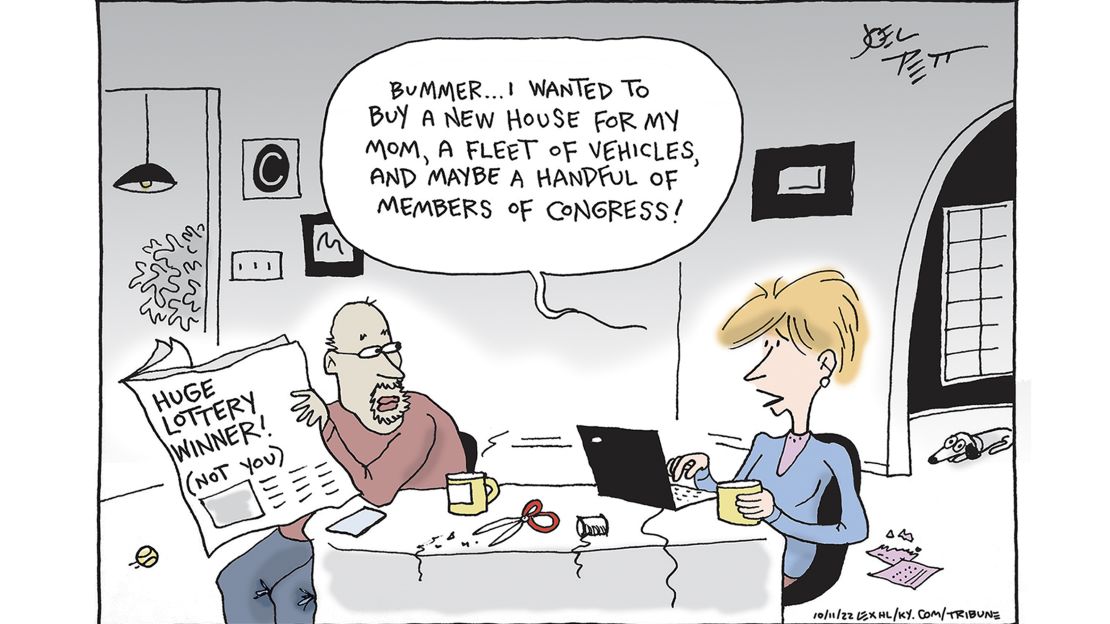
Bill Carter and his wife don’t normally buy lottery tickets, “having long concluded that it felt like burning a $10 bill (sometimes a $20 bill) on a barbecue grill.”
But last week’s Powerball caught their attention as it soared toward a $2 billion jackpot – and they bought a few tickets. “How could we not? Think of what we could do with all that money!”
“Really: What would we do with all that money? After helping the kids, donating to charities, buying several homes, etc., what else? Build a ‘money bin’ and swim around in it like Scrooge McDuck? (Unwise. Money can make you liquid, but it is not, in fact, liquid.)”
“What’s interesting is how many people, like us, ignore lotteries until they soar to staggering amounts. Even a $100 million prize now barely raises eyebrows. As though that’s too piddling to care? Wouldn’t $100 million change most people’s lives forever?
“It would mine. But I don’t buy tickets at that level. I only get the bug at about half a bill, but two bill? Ok, you really have my attention.
“What is that about? It’s such an old impulse it’s in Greek mythology.”
Bill isn’t about to become King Midas. The winning ticket was sold at an Altadena, California, gas station to someone who has yet to be identified.
Don’t miss
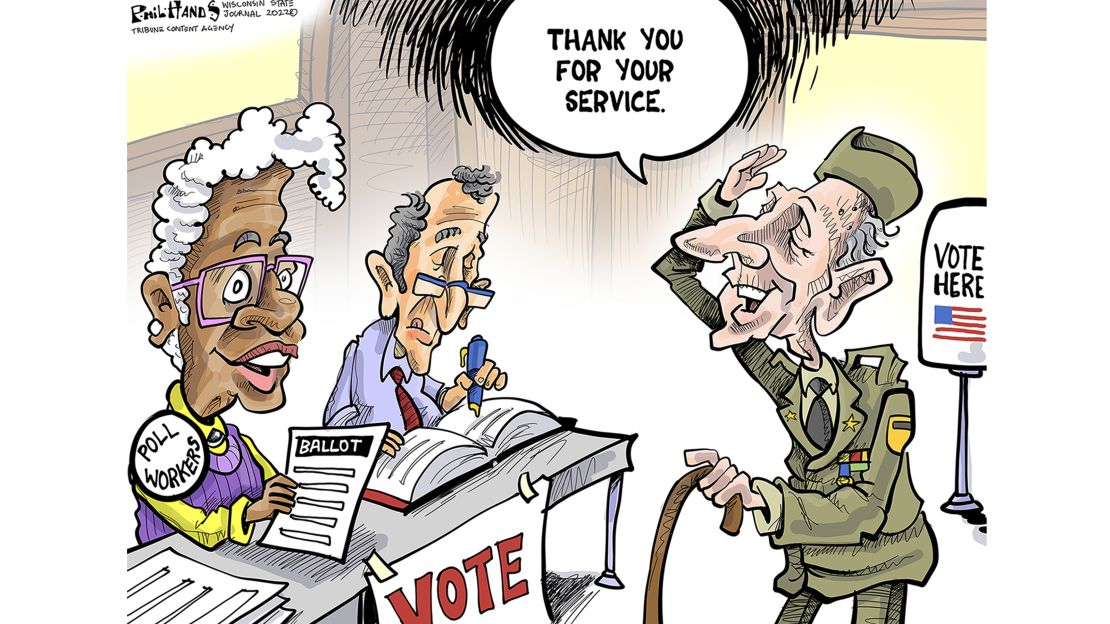
Emily Parker: No one is coming to save the crypto industry
Rosabeth Moss Kanter: Finally companies have to be upfront about job pay ranges
Steve Vladeck: The judge blocking student loan relief for millions is wrong about the law
Q&A with Helena Gualinga: The small Amazon community making big oil think twice
Gene Robinson: At 39, my life began again. ‘My Policeman’ brought memories rushing back
Michael J. Nyenhuis and Sherrie Westin: Why Ameera is a Muppet with the wrong wheelchair
Terence Moore: Why Dusty Baker’s World Series victory was so sweet
Michelle Garcia: The US must free itself of political delusions about the border
AND…
Superman’s real love story
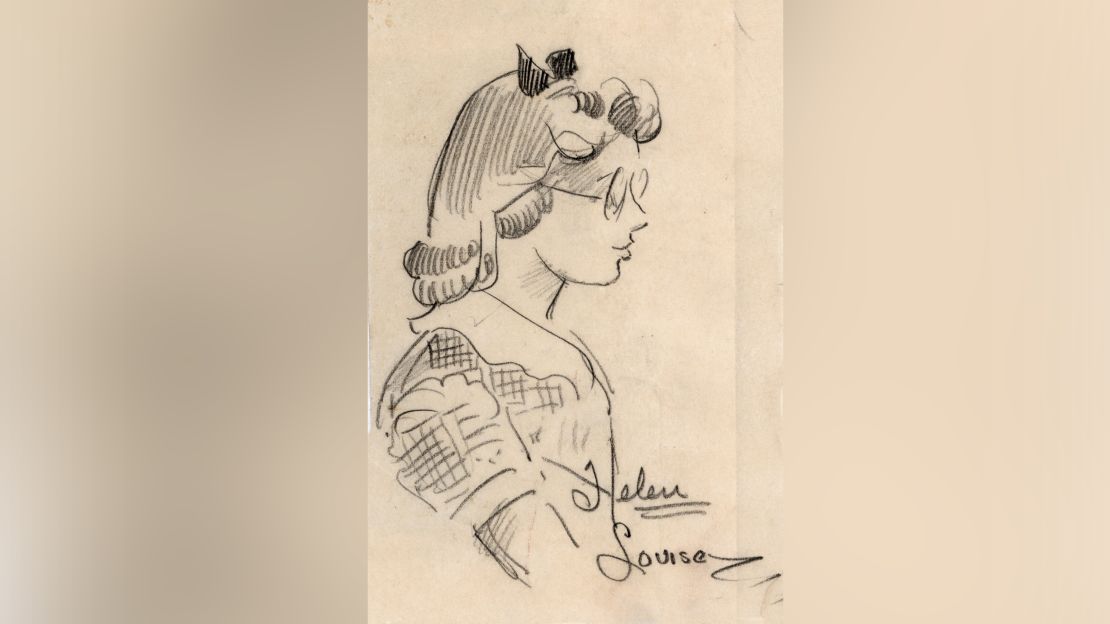
The origin story of the Man of Steel is well known. As pop culture historian Roy Schwartz noted, “In 1934, at the age of 18, (Joseph) Shuster and classmate Jerome Siegel came up with a revolutionary idea: Superman. He was the first superhero, a concept so unprecedented that, as Siegel detailed in his unpublished memoir, every newspaper syndicate in the US rejected it for being too fantastic for children to relate to.”
Shuster described himself as “mild-mannered, wore glasses, was very shy with women” – more Clark Kent than Superman.
But as Schwartz wrote, Shuster had a relationship with Helen Louise Cohen, a fellow resident of Cleveland, who might have borne a resemblance to Superman’s eventual wife Lois Lane. Shuster sent her sketches of Superman along with at least one drawing of Cohen, and heartfelt letters in neat script.
Ultimately, she broke it off, choosing instead to marry “a dashing officer, later awarded the Legion of Merit and eventually becoming a colonel in the Army’s 88th Infantry Division.” Shuster was too nearsighted to enlist in the military during World War II.
Cohen would later tell her sons, as Schwartz noted, that “Shuster was simply too mild-mannered for her.” But she kept his letters and sketches and now the family is sharing them with the world, Schwartz wrote.
“The real-life Clark never got his Lois, but his creation continues to woo her more than 80 years later.”

